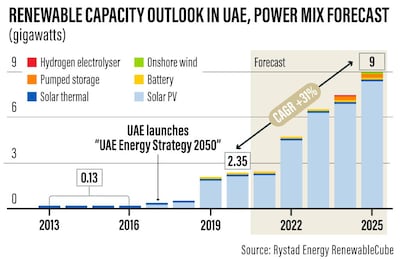The UAE’s renewable energy capacity is set to increase four-fold to about 9 gigawatts (GW) by the end of 2025 as the country starts new projects to diversify its energy mix, according to Rystad Energy.
“Solar PV (photo voltaic) additions are going to pile up, especially from 2022, and drive the country’s total renewable capacity to an impressive 9GW by the end of 2025,” the Oslo-based consultancy said in a new report. The UAE's total renewable capacity reached 2.3GW at the end of 2020.
Four new projects, which are in various stages of development, will drive this growth, the report said. The biggest is the 2GW Al Dhafra solar scheme in Abu Dhabi as well as new projects in Dubai and the Northern Emirates.
A consortium led by Abu Dhabi National Energy Company (Taqa) and Masdar, in partnership with France’s EDF Renewables and China's JinkoPower, is building the Al Dhafra plant, which is the world's largest solar power project.
Taqa will own 40 per cent of the Al Dhafra project, while Masdar, EDF Renewables and JinkoPower will each have a 20 per cent stake. The plant is expected to become fully operational in 2022 and will generate enough electricity for about 160,000 homes across the UAE.
Dubai currently has more than 1GW of installed capacity, all of which comes from the Mohammed Bin Rashid Solar Park’s three existing phases. Two more – a 200MW concentrated solar power and a 900MW solar photovoltaic scheme, are currently in development.
Dubai exceeded a long-term green energy target for 2020 in June, increasing the share of renewables in the emirate’s energy mix to nearly 9 per cent, according to the report.
Abu Dhabi, on the other hand, has set a target of 5.6GW of solar PV capacity by 2026 and its current installed capacity stands at 1.3GW, with the Noor Abu Dhabi and Shams solar projects contributing most to the emirate’s renewable energy capacity.
“Despite the Covid-19 shock, the government has provided a reasonable amount of investment to continue ongoing projects,” Gaurav Metkar, senior analyst at Rystad Energy, said. “[The] UAE has already attracted big international players in the renewable sector, a healthy sign for future business.”
The UAE is also home to one of the lowest tariffs in the world, with solar prices declining by more than 76 per cent in the past four years.
The Al Dhafra project has one of the world's most competitive tariffs for solar power at Dh4.85 fils per per kilowatt hour.
“Given the country’s current project pipeline, [the] UAE’s renewable capacity is on track for an impressive compound annual growth rate of more than 31 per cent towards 2025.”
The share of renewable energy in the UAE’s overall power generation mix will increase from 7 per cent in 2020 to 21 per cent in 2030, and to 44 per cent by 2050 due to the development of new projects, Rystad Energy's report said.



